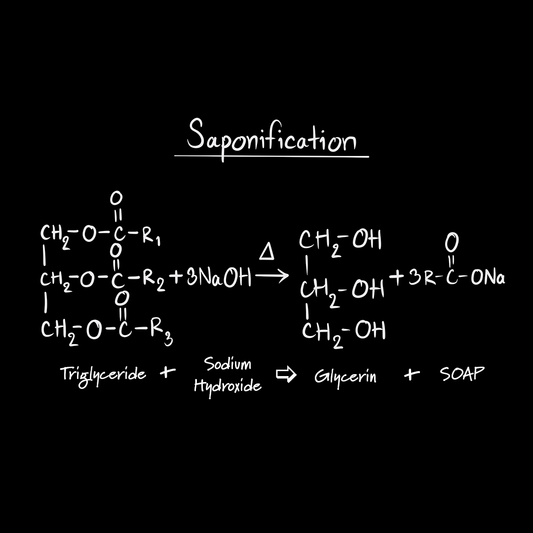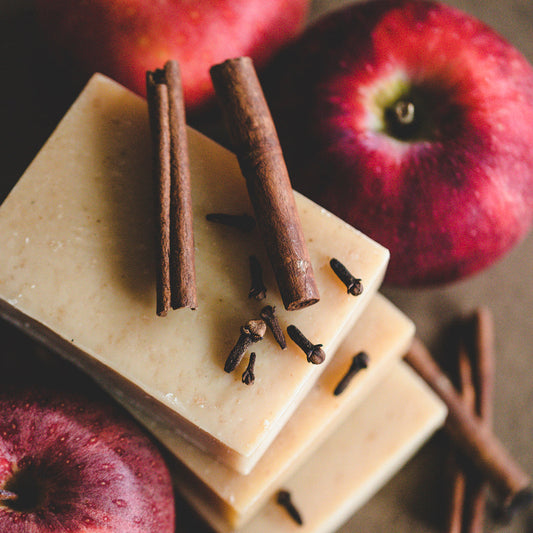Does Goat Milk Soap Really Prevent Aging?
As a soap maker, I am often asked questions about the benefits of goat milk soap. Recently a family member saw an ad for goat milk soap that claimed to prevent aging and asked me to explain how that worked. I could not!
As a curious soul, I began searching around the internet which is filled with claims that “science has confirmed” all of the miraculous features that goat milk soap can offer.
 Did you know that goat milk SOAP can:
Did you know that goat milk SOAP can:
• reduce wrinkles
• prevent age spots
• delay signs of skin aging
• maintain the natural skin microbiome
• maintain the natural pH of the skin
• prevent acne
• reduce scarring
• exfoliate skin
• heal infections
• offer numerous antimicrobial properties
• prevent skin cancer
• protect skin against damage from sunlight
• repair damaged skin
Wow and that is not even the whole list! Now, don’t get me wrong, I love goat milk soap, but for those of you that follow our blogs, you know that I do not like marketing hype. So, let’s delve into just a few of these claims.
pH Balanced: Some soap companies claim that since the pH of goat milk is closer to the pH of the skin, using goat milk creates a more pH-balanced soap. The average pH of goat milk is around 6.5. If the pH of distilled water is a bit less than 7, how can swapping the water for goat milk achieve a pH-balanced soap when your acid mantle is supposedly around 5.5? Goat milk soap may be great for your skin, but it is not because it is "pH-balanced." Learn More Blog: What is pH Balanced Skin Care?
Prevents Skin Cancer: There is information circulating that the mineral selenium can help prevent skin cancer. Not only is the research inconclusive, but the studies are regarding taking selenium supplements, in other words ingesting selenium. Now goat milk does contain selenium and it has about 27% more than cow’s milk, but what does that have to do with soap?
Delays Signs of Aging: Goat milk is an excellent source of vitamin A and vitamin A has antioxidant properties. We have all read the information about the relationship between antioxidants and aging. While there have been some studies showing that Vitamin A may have an effect on fine lines and facial wrinkles when used in topical products, the amount of vitamin A available in a soap, a product that does not remain on the skin, is not significant.
Exfoliates: Goat milk, like other dairy products, naturally contains lactic acid. Lactic acid, an alpha hydroxy acid (AHA), works as a mild exfoliant to help break down dead skin cells. Again while there is evidence that AHA may be beneficial in topical skin care products, the amount in soap, a product that does not remain on the skin, is not significant.
I think you get the picture. While these claims about goat milk soap are repeated everywhere, any science used to back them up is either misleading or seriously flawed. You can read many of the claims I mentioned above almost word for word on numerous soap company sites. Just type "benefits of goat milk soap" in your search bar.
So Why Do Companies Spread These Erroneous Claims?
It is what I call the "internet train."
Someone reads something they like or that makes sense to them, so they add their car to the moving information train in order to spread the news. The unfounded claims grow exponentially on the internet as they are repeated over and over again. As they gain traction the train grows larger and larger until the claims have become accepted as the “truth” that few people will question.
Some companies know that their hyped-up claims are misleading. But others may believe the claims are true since they have not thoroughly researched the "internet" information. It is SO easy not only to spread but be taken in by misinformation. Terms like "Experts claim," "Scientists agree," and "Research shows" make us feel good about and even believe the information we are reading and sharing.
One quick note, I am NOT talking about the benefits of drinking goat milk or even using it topically in a bath soak or creating a face mask. After all, legend says that Cleopatra enjoyed a goat milk bath daily to preserve her youthful appearance.
What is Goat Milk Soap
Goat milk soap is exactly what it sounds like, soap made using milk from goats.
Soap is made during a chemical reaction called "saponification which comes from two Latin words "sapon" meaning soap and "facere" meaning to make.
Natural Goat Milk Soap is made using the same traditional cold-processed method we use for all of our soaps in which an acid is combined with a base in order to produce soap and glycerin.
Acid (Fats/Oils) + Base (Sodium Hydroxide/Lye) = Soap + Glycerin
Lye comes in small crystals and must be dissolved in a water-based liquid for the saponification reaction to occur. While the typical liquid used in most soaps is water, when making goat milk soap, goat milk is used instead.
To learn more about the chemistry of soap making read our blog, "The Chemistry of Soap Making"
So what is the science behind the benefits of goat milk soap?
 Unfortunately, while there is lots of anecdotal information concerning the benefits of goat milk soap, there is little scientific research.
Unfortunately, while there is lots of anecdotal information concerning the benefits of goat milk soap, there is little scientific research.
Anecdotal evidence is a story told by individuals. It is subjective information that comes from personal experience or observation and is influenced by that person's perspective and biases.
I believe that there is value to anecdotal evidence in that it provides a starting point to help us ask really good questions. However, it is not scientific evidence, which can be verified objectively.
There have been studies showing the benefits of goat milk soap when compared to commercial soap, but that one is a no-brainer.
For those who have read the history of our company, it was my first little batch of Goat Milk Oatmeal Soap that cured my husband’s eczema and propelled my journey into organic skin care.
My husband’s eczema has not returned in the 22 years he has been using my soap. But I must be honest here, he now uses all of our soaps. His favorite is actually the Juniper Mint. I believe that his miraculous recovery was not the result of what was IN our Goat Milk Soap, but what was NOT in it.
As a science nerd, I am a firm believer in scientific evidence. However, sometimes the research is just not there.
I remember when my second child was born I was asked to participate in a breastfeeding study. This was a time (over 40 years ago) when breastfeeding was just coming back into the mainstream. The study was to determine whether breastfed babies gained weight and if mothers produced enough milk to meet the demands of a growing infant. I was a newborn nursery nurse at the time and was quite amazed that this was something that actually required scientific study. I was told the research was needed to convince the medical community that breastfed babies were healthy. Seriously?
So why do I use goat milk in some of our soaps? Because I like the results.
We do not skimp on the amount of goat milk used in our recipes and after 22 years of making soap, I do have some thoughts about what goat’s milk adds to a soap recipe.
I do not approach making soap as a craft. To me, it is about the science of how the components of fats and oils, mainly their fatty acid composition, react with lye to make a quality bar of handmade soap. The choice of which specific fats and oils to use as well as their proportions is critical.
Fat molecules are an important part of making good soap and thick and creamy goat milk is rich in both saturated and unsaturated fats, making it an ideal ingredient in a soap recipe. Saturated fats lend a rich, creamy, silky and bubbly quality to the lather, while unsaturated fats provide creamy moisturizing properties.
Goat Milk also contains fats that remain unsaponified in a soap recipe. This means they remain as free fat in a finished bar of soap. While we already add extra oils and butters, called superfatting, the extra fat that goat milk seems to add more moisturizing properties to the soap. Goat milk produces a bar of soap with a creamy, buttery feel that I just love.
Fatty Acids in Goat' Milk
 Goat milk contains three special fatty acids, capric, caprylic, and caproic. The names of these acids come from the Latin word "capra," meaning "goat" since all three are found most famously in goat milk.
Goat milk contains three special fatty acids, capric, caprylic, and caproic. The names of these acids come from the Latin word "capra," meaning "goat" since all three are found most famously in goat milk.
Capric acid occurs naturally in coconut oil and in smaller amounts in palm kernel oil but it is uncommon in typical plant oils. These three saturated fatty acids together total 15% in goat milk fat.
In our blog about the Chemistry of Soap Making, I discuss the most common fatty acids found in soap making oils. These three acids are not typically considered when formulating a soap recipe.
I was unable to find any research regarding the possible contribution of these three fatty acids to a bar of soap. However, we know that the depending on what type of fatty acids are present, the resulting soap can have completely different properties. Perhaps these three "goat" fatty acids contribute something special to a bar of goat milk soap. (Sounds like a great research project)
Conclusion
Goat milk soap may not prevent aging, age spots, cancer, or wrinkles, but it produces a lovely, soothing bar of soap.
 There may be no studies to back up the claim, but many individuals who experience skin irritation, even with other natural soaps, claim to do better with goat milk soap.
There may be no studies to back up the claim, but many individuals who experience skin irritation, even with other natural soaps, claim to do better with goat milk soap.
Natural handmade goat milk soap, especially when unscented and properly formulated, is a mild, gentle soap generally considered safe for everyone. It is the only soap ever used on my newborn and young grandchildren.
Before you choose a goat milk soap be sure to read all of the ingredients. Simply because it contains goat milk does not mean that the soap is mild or natural.
Stay away from goat milk soaps made with synthetic colors, fragrances, preservatives, or other artificial ingredients that can cause skin irritation.
All Goat Milk Soaps are not created equal!
Have you tried a Goat Milk Soap? What was your experience?
Experience our full line of organic soaps.







